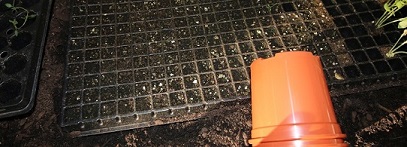Conservation Horticulturist
The contribution that amateur gardeners make to the conservation of the world’s plants has never been more important and extensive, and yet it rarely gets any recognition. By the same token, the role of back gardens as a habitat for birds, pollinators and other invertebrates, is widely underestimated. In addition to a general interest in all aspects of Natural History, gardeners have skills that are vitally important for plant conservation, whether that conservation happens within their garden or in the plant’s habitat.
Where They Work
Conservation horticulturists are employed not only by botanical
gardens but also by non-governmental organisations whose aims are the
conservation of animals and plants – birds need plants too. Conservation Horticulturists may also advise and work in and develop private conservation gardens and larger private properties.
What They Do
Ex situ conservation of plants is when the plants are taken away for the habitat where they are being threatened, and they are cultivated in safe, optimum conditions. These plants are then propagated from seeds or vegetatively by cutting or even tissue culture. These new plants can then be used to establish other ex situ populations or to establish a new well-protected population in the plant’s original habitat.
The conservation of plant species is fundamentally different from the conservation of animals because most plants produce seeds that can be dried and frozen and stored safely for thousands of years. Of course, this is only successful if the seeds can be germinated after the years in the freezer. This is where the conservation horticulturalist becomes the lynch-pin of plant conservation.
Not all of plant conservation happens ex situ. Some of it happens in situ in the plants’ habitats. Here too, the conservation horticulturist is required because most habitats require some level of management if the endangered species are to be preserved successfully. This management may be cutting of meadows or planting of hedges, or it may even be sowing meadows or planting woodlands. All of these are essentially gardening – just on a very large scale.

What is Needed
Most conservation horticulturists will have a mix of fundamental horticultural knowledge along with a strong understanding of environmental issues. They may also study native plant populations and interactions.
If you are interested in working as a Conservation Horticulturist or are interested in pursuing work in this area, you may be interested in the following courses which ACS offer -
Amenity Horticulture II
Genetics
Practical Horticulture II
Soil Management - Horticulture
or view our full range of gardening courses - all available to start at any time.
If you have any questions, or would like to know more, please get in touch with our Horticulture Tutors today. They are all highly experienced and knowledgeable and will be happy to help with any questions. You can get in touch by -
Phone (UK) 01384 442752, or (International) +44 (0) 1384 442752, or
Email us at info@acsedu.co.uk, or use our
FREE COURSE COUNSELLING SERVICE.
More from ACS
Ebook - Advice from professional horticulturists with decades in the industry.
View eBook
Very comprehensive - great starting point to your career in horticulture.
View Course
20 hour self paced study - how to identify plants - basic botany, taxonomy, terminology
View